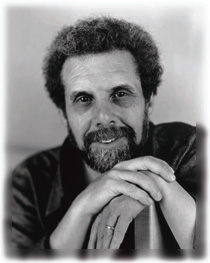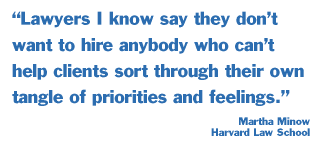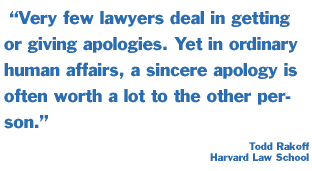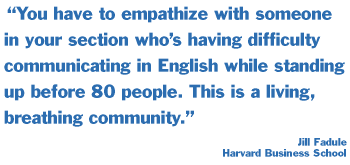Main Menu · Search ·Current Issue ·Contact ·Archives ·Centennial ·Letters to the Editor ·FAQs
 
|
Not long ago, Zinedine Zidane acted impulsively and nearly destroyed a grand enterprise. The star midfielder on France's World Cup-winning soccer team, Zidane is considered the game's best playmaker. Yet in a World Cup match against Iran, with France winning easily, Zidane, in a fit of pique, stepped on a downed Iranian opponent. The offense drew a red card from an official that kept Zidane out of World Cup action for the next two weeks; without him, the French side barely escaped with an overtime win against Paraguay. Then the star returned and, with greater self-control, led the French to victories over Italy, Croatia, and Brazil. In so doing, he validated a prediction that Brazilian sports psychologist Suzy Fleury had made to Daniel Goleman, Ph.D. '74, before the tournament: "The team that wins the World Cup will be the one with the most emotional intelligence."
 Daniel Goleman. Photograph by Frank Ward
Daniel Goleman. Photograph by Frank Ward |
Fleury's choice of words was no accident: Goleman's 1996 book Emotional Intelligence is a global bestseller, with 4 million copies in print in 24 languages. "Emotional intelligence"--a blanket term that includes, in Goleman's words, "self-awareness, managing your emotions effectively, motivation, empathy, reading other people's feelings accurately, social skills like teamwork, persuasion, leadership, and managing relationships"--is an idea whose time has come, apparently. This fall, Bantam will publish a sequel, Working with Emotional Intelligence, in which Goleman maps these skills into the realms of work and career. Since Zidane is a professional athlete, his temperamental lapse could in fact be seen as an error of business judgment. "That was an 'emotional hijacking,'" says Goleman, his term for moments when strong feelings overwhelm reason, judgment, and perspective.
"Emotional intelligence" may seem an oxymoron, since our society has long associated intelligence purely with intellect, analysis, rationality--the cerebral capacities measured by IQ tests and the Scholastic Aptitude Test. In contrast, Goleman deals with the feeling side of life--joy, hurt, anger, sadness, jealousy--and asserts that human beings can also handle these states intelligently--although often they do not.
The sine qua non of emotional intelligence is awareness of one's own feelings. Knowing one's emotional state allows the possibility of expressing feeling appropriately, or perhaps consciously suppressing it. Self-awareness allows us to take an emotional upset into account before acting on the powerful impulses it generates--in other words, managing our emotional responses. We cannot manage feelings of which we are unaware--as in an emotional hijacking, when emotions express themselves in words and deeds before the person has actually identified their nature or even their presence.
Awareness of our own feelings also enables us to perceive the feelings of others accurately--to be empathetic, to feel with another person. Empathy forges emotional connection, and so tends to bond people together even more deeply than shared beliefs and ideas. Empathy, in Goldman's view, underlies many interpersonal aptitudes like teamwork, persuasion, and leadership.
Born in Stockton, California, Goleman graduated from Amherst College and earned his doctorate in personality and development at Harvard. As a graduate student, he and his adviser, the late professor of psychology David McClelland, mused over why IQ and personality tests were such poor predictors of success in the real world. A Harvard predoctoral traveling fellowship took Goleman to India, where he learned to meditate. Eventually he wrote his dissertation on meditation as an antidote to stress; 30 years later, he still meditates and has written books on the topic.
Ultimately, Goleman applied his academic training as a journalist and author. For 12 years he was a behavioral science writer for the New York Times, where his work was twice nominated for the Pulitzer Prize. He also published several books before the commercial breakthrough of Emotional Intelligence.
Today Goleman consults internationally and lectures on emotional intelligence to business and professional groups. He lives in western Massachusetts with his second wife, Tara Bennett-Goleman, a psychotherapist. She is a longtime student of the Japanese tea ceremony, and behind their house a winding path leads up a hill to a tea house commanding a majestic view of the surrounding Berkshires. Typically, Goleman will do his morning meditation in the tea house and then turn to his laptop computer.

For his new book, Goleman has done two years of research, including a review of internal studies by nearly 200 large companies of their most successful employees. "The research shows that for jobs of all kinds, emotional intelligence is twice as important an ingredient of outstanding performance as cognitive ability and technical skill combined," Goleman says. "And the higher you go in the organization, the more important these qualities are for success. When it comes to leadership, they are almost everything.
"The problem in all these high-intellect fields--like law, medicine, and business management--is that everybody has passed the same intellectual hurdles to get in," he continues. "Practically all lawyers will have an IQ of at least 110 to 120, good enough to handle law school and pass the bar. Consequently the added advantage of being at the high end intellectually is small compared to the benefit of having emotional intelligence--for which there are almost no selection pressures! At least no systematic ones, which means there's a much wider range of variation. 'Rainmakers' at law firms bring in new clients not because of their LSAT scores, but because of the kind of people they are--charismatic, likable, trustworthy. In all these professions, intellect and technical expertise get you so far, but it's the human qualities that make you a star."
Failures of emotional intelligence also have their price, says Goleman, citing a New England Journal of Medicine study on malpractice cases. "About 1 percent of all hospital patients have something happen that could be grounds for a malpractice suit, but only a tiny percentage of these patients sue. Doctors that patients don't like get sued more; although their medical skills may be comparable to other doctors', the patient feels, 'He didn't care about me. He didn't listen. He didn't let me ask questions.' If you were a medical school, you'd want to prepare your students by cultivating qualities of empathy."
Emotional clumsiness is also a liability in corporate life. Professor of psychology Philip Stone says, "In the modern corporation, people who go totally ballistic are no longer tolerated, unless they are so extremely bright that people have to put up with them. Socio-emotional intelligence is crucial, especially in the service sector where you have continuing relationships with customers. In this economy, the one-shot encounter--jobs like checkout clerk in a supermarket--is becoming rarer."
Yet at higher levels of the corporation, emotional intelligence can have two faces. "Machiavelli had a lot of emotional intelligence," says Shoshana Zuboff, Ph.D. '80, Wilson professor of business administration. "The 'prince' was able to be successful because of his insight into people and their motivations, how they could be influenced and manipulated. People in corporate life who have this kind of outer-directed savvy can rise; it allows them to navigate the sociopolitical environment very successfully. That makes you a star performer in a very narrow sense.
"But if Machiavelli is one pole, Socrates is the other--'Know thyself,'" Zuboff continues. "Self-awareness, self-knowledge, self-discipline are related to the capacity to create meaning in one's life, to live a full and rich life. In a corporate environment, that kind of emotional intelligence can actually be crippling. The corporation is not friendly to people who are empathic, sensitive, aware of themselves and of the meanings and consequences of their actions. The rewards are still built around power, position, money. People with high levels of sen-sitivity do not respond to these rewards and cannot be controlled by that motivational system. Those with autonomy and self-control have a hard time bending to corporate discipline and order; in fact, business executives often talk candidly about how you have to trim the sails of your personality to fit the mold. The more emotional intelligence people have, the more difficult it becomes to mold themselves to the requirements of the corporation."
To help such people find their way, Zuboff runs a business school program for mid-life executives called "Odyssey," which aims to deepen "internal" emotional intelligence, "to learn about one's inner resources and individuality," she says. "These things can be taught, but one has to want to learn them and be ready."
In legal practice, "you need a much greater range of skills than the things most of us focus on in law school," says Byrne professor of administrative law Todd Rakoff '67, J.D. '75. "The general public perception is that lawyers are more unfeeling than they ought to be. Maybe we don't teach enough about the relationship between lawyer and client. The attorney may overemphasize legal remedies; sometimes lawyers are a little tone-deaf when it comes to what a client really wants. When you settle a suit, what you get for a client is just money, but the client often wants some statement that he or she was right. You may not be able to get that unless you go through a long lawsuit. Very few lawyers deal in getting or giving apologies; no one expects them to. Yet in ordinary human affairs, a sincere apology is often worth a lot to the other person."
Legal work often means acting as an emotional buffer of sorts. "To some extent, part of what you are paid for as a lawyer is to take responsibility under conditions of stress and tension," says Rakoff. "Since the practice of law is so often adversarial, it is potentially abrasive, and people who can't develop the emotional skills to deal with that kind of tough situation, without losing control of themselves--and while continuing to be effective--are in trouble."
Professor of law Martha Minow, M.Ed. '76, adds, "Lawyers I know say they don't want to hire anybody who can't talk to a client. By that, they mean understanding a client's concerns and motivations, helping clients sort through their own tangle of priorities and feelings. You need these skills not just in family law but in corporate law, takeovers, complex tax issues. It's a fair criticism of legal education that we don't spend much time cultivating these capacities."
"Connections--doctor with patient, doctor with family, patient with family--are powerful healing phenomena," says clinical instructor in psychiatry Steve Bergman '66, M.D. '73. "With post-surgical recovery, breast cancer, or even the
common cold, patients who have good connections with caregivers and others have lower morbidity and mortality." Bergman has devoted much of his career to the subject of "how to remain human while practicing medicine," as he puts it. His recent book, We Have to Talk: Healing Dialogues between Men and
Women, written with his wife, psychologist Janet Surrey, Ed.M. '69, focuses on the kind of mutual bond he believes is also central to the healing relationship: authentic interpersonal connection.

"The traditional old-time general practitioners had a lot of emotional intelligence," Bergman says. "In fact, they didn't have too much else--half of their ideas were wrong and two-thirds of their medicines were probably harmful. But though the science was not good, the main thing they did was to be with people in their illness. The connection that these doctors made was healing."
Bergman prefers the phrase "relational intelligence" to "emotional intelligence," noting that "the emotions you show are most intelligent when they're used in the service of making good connections." Of course, he adds, "a good connection is a mutual connection. One-way empathy may not be healthy. For example, a woman who's empathic and understanding toward a boss who is abusing her is not operating with relational intel-ligence. The healthy connection is where he also feels some empathy for what's going on with her."
But Bergman also observes that medical training and practice create situations where emotional choices are ambiguous: "In these big systems, it's helpful sometimes to deny the emotions you are having. Imagine a young male medical student who was present when a patient learned that she was about to die. Perhaps the patient cried and the student began to cry along with her. If another medical student witnessed this, it would be reasonable for the first student to say, 'Don't tell anyone about this; I'm going to have to present this case.' At times it's relationally intelligent to hide your feelings from the system."
Given these complexities, can emotional intelligence and its appropriate application be learned--and taught? "Absolutely. It's all learnable," says Goleman. "Unlike IQ--which some argue doesn't change throughout life--emotional intelligence can be developed. It's a neurological fact that the brain is plastic throughout life; brain structures and circuits shape themselves through repeated experience. You can discipline yourself and get better at things you once weren't good at. In fact, emotional intelligence tends to increase through each decade of life. It's what we used to call maturity--how we handle ourselves and other people. You get better at it as you age.
"There's always been a tutorial that has helped people change in the emotional intelligence area," he adds: "Psychotherapy." Meditation can also help: Goleman cites a study by Richard Davidson, Ph.D. '76, who worked with microbiologists developing new products under high pressure, facing tight deadlines and complex tasks. Over an eight-week period, they learned a "mindfulness" meditation practice from a psychologist and put it into daily practice. Davidson examined before-and-after activation patterns in the scientists' brains using Magnetic Resonance Imaging (MRI). "Not only did the scientists feel calmer and more energized, but the left frontal cortex became more active," says Goleman. "That's an area of the brain that both calms distress and generates positive feelings. It's very impressive evidence that the brain can change in ways that support emotional learning."
But, short of meditation and psychotherapy, can graduate and professional schools teach emotional intelligence? "I'm skeptical about the extent that you can make socio-emotional weaknesses into strengths through training," says Philip Stone, citing an adage: "You can teach a pig to climb a tree, but it's easier to hire a squirrel." Last year Stone taught an undergraduate course on "the person-job fit," a topic he has worked on with private clients. He believes that "the American hero isn't the person who can do everything. American heroes are those who recognize their strengths and weaknesses, and team up with other people whose strengths balance and complement their own."
Goleman counters, "The evidence is very strong that people can improve in these areas. Too many corporate training programs are a waste of money--they are badly flawed and have poor results, so it looks like it can't be done. But it could be done routinely as part of professional education in graduate school."

Harvard Business School fills the 880 places in its M.B.A. program from 8,000 applicants by a process that emphasizes relational skills, according to Jill Fadule, M.B.A. '89, managing director of M.B.A. admissions and financial aid. She notes that Harvard's application form is "the longest one of any business school. There are eight essay questions--like 'Tell us about a time you failed, and what you learned from it.' We are very interested in how they have been able to succeed with and through other people. Suppose someone tells us that he was elected captain of the football team: 'I was the most talented player, and we ended up winning the conference title.' He thinks that's excellent evidence of leadership--and it may be--but he didn't show us how his success arose through working with, and through, others. When we see people succeeding by persuading, coordinating, motivating others--that helps separate the wheat from the chaff."
The M.B.A. program divides its first-year matriculants into "sections" of 80 students, who take all their first-year courses together. Each section elects a variety of leaders--an education
representative, chairs for social, athletic, and technology matters. The sections establish norms of conduct, like not raising hands in class while someone else is speaking, or making sure that no one in the section fails the program. "Half of your grade is based on class participation," says Fadule, "so you have an explicit responsibility to your section: you're responsible for what everyone is learning. On average, the professor speaks only about 15 percent of the time.
"The program is a transforming experience," she continues, "and it comes from the dynamic of being with this family, this company of 80 people, that you're going to live with all year long--resolving disagreements, learning from each other, and constantly moving forward. You have to empathize with someone in your section who's having difficulty communicating in English while standing up before 80 people. This is a living, breathing community." Reinforcing these principles, the business school's grading system--a 1/2/3 breakdown, in which 80 percent of the students receive a "2"--helps de-emphasize grade competition, and a plethora of assigned team projects helps teach students to be good team leaders, good team members, and how to create effective teams.
Even so, Philip Stone notes that "if you spend two days in the halls of Harvard Business School and two days in the halls at Kellogg [Northwestern's business school], you'll see a remarkable contrast. Kellogg is the friendly Midwest, part of the American economic engine, not a wheeler-dealer place where somebody goes to become a lone-star performer. At Harvard, you've been competing like crazy, but at Kellogg there is a team atmosphere."
In medicine, "More and more health care is being delivered in teams," says Ebert professor of molecular medicine Michael Rosenblatt, M.D. '73, faculty dean for academic programs at the Beth Israel Deaconess Medical Center. "So you need the human skills to succeed with your colleagues." Harvard Medical School's New Pathway curriculum teaches through tutorials: "Much of the learning occurs in small groups, which forces the doctors in training to interact with each other," Rosenblatt says. "Ten or 15 years ago the curriculum included lots of lectures in large classrooms. Now we have moved to problem-based learning, and at the center of those problems are patients. From the first day of med school, you see patients."
Paradoxically, technology can also help humanize, according to Rosenblatt. "Under managed care, patients often spend no more than 20 or 30 minutes in a doctor's office," he says. "Let's say you have a medical student who's in a room with a patient and a doctor on the faculty. You would like the student to learn about the disease that patient has--if it's diabetes, how to diagnose diabetes, how to match insulin to blood sugar levels, and so on. But you would also like the teacher to be a role model for how you get information from a patient--what is it about that doctor that builds that bond of trust? To do all that in 20 minutes is nearly impossible. So let the student learn about managing blood sugar by working with a computer program; then the professor can say, 'Let's focus on how I am talking to this patient, getting a history, and the social and cultural aspects of the interview.' You'll use that half-hour more effectively."
Bergman agrees that "in the first two years of medical school, the preclinical years, there are good things happening in medical education all across the country; there are some efforts to emphasize good connections with patients. But in the third and fourth years," he maintains, "the students go into the clinics and there's the same old emphasis on intelligence and nothing else." Bergman's course "How to Stay Human in Medicine" was once part of the clinical rotation in psychiatry at McLean Hospital; it was canceled in 1992. "They told me they needed the time for pharmacology, to teach the students to give drugs," he explains.
For his part, Goleman believes that medical education ought to include some basic tools of emotional intelligence, "especially self-awareness and the arts of empathy and listening." Ironically, he writes, as more patients seek a more human medicine, "the changing culture of medicine itself, as it becomes more responsive to the imperatives of business, is making such care increasingly difficult to find." But since emotionally responsive care makes patients more satisfied with their doctors and their treatment, it may also be justified economically--so misdirected medical education may backfire. Goleman writes: "In the emerging medical marketplace, where patients often have the option to choose between competing health plans...souring experiences can lead patients to go elsewhere for care, while pleasing ones translate into loyalty."
"There are real gems in the medical system, people who have wonderful abilities in relating with people," Bergman says. "But in my three decades in academic medicine, that has not been the quality rewarded by promotion. Even though we've recognized the importance of emotional intelligence, what we reward is research, publishing, raising money, getting grants." Rosenblatt insists that the situation has improved, at least at Harvard Medical School: "A whole new avenue for promotion has opened up, via contributions to medical education and teaching, not just research and publication. Now people can make a career of being high-level medical educators, and be promoted all the way to a full professorship."
Unlike the business and medical schools, Harvard Law School does not interview applicants for admission. But, says Martha Minow, "We don't just want people with perfect grades and perfect test scores." Once admitted, the law students' training in emotional intelligence tends to occur on an elective basis, rather than arise from the basic pedagogical structure. Clinical programs, for example, enable students to encounter the realities of the attorney-client relationship first-hand; although some students take no clinical programs at all, others devote as many as 25 to 30 hours weekly to such work. The negotiation and mediation programs--whose most celebrated exponent has been Williston professor of law emeritus Roger Fisher '43, LL.B. '48, coauthor of Getting to Yes--also train students in accurately reading other people's concerns and motives. And, Minow notes, "The arc of inspiration behind the case method is that it does require some degree of empathic imagination; you take these cold factual documents and reconstruct the client's actual concerns."
In this connection, she cites a quotation that may be the most celebrated in legal scholarship, but could apply to the entire realm of emotional intelligence. "The life of law has not been logic," wrote Oliver Wendell Holmes Jr., A.B. 1861, LL.B. 1866, LL.D. 1895. "It has been experience."